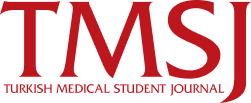ABSTRACT
Aims:
The most common and the most dramatic complication of ovulation induction is overian hyperstimulation syndrome. The syndrome has a wide range of clinical manifestations ranging from mild ascites to life-threatening conditions. In this case report, it is aimed to examine a patient with polycystic ovarian syndrome who was hospitalized with pulmonary symptoms and widespread ascites in abdominal cavity developed due to ovarian hyperstimulation syndrome.
Case Report:
After ovulation induction, intrauterine insemination (IUI) was performed on the 26 year-old patient with the history of primer infertility, hypothyroidism, polycystic ovarian syndrome for 4 years. Ten days after IUI, the patient applied to our clinics with abdominal distention, dyspnea, cough, nausea, vomiting and was admitted to our Obstetrics and Gynecology Clinic. The patient developed plevral effusion and diagnosed with Grade-4 Ovarian Hyperstimulation Syndrome is presented in this case report.
Conclusion:
Ovulation induction and intrauterine insemination are the most frequently used assisted reproductive methods that cause Ovarian Hyperstimulation Syndrome (OHSS). The patients with Polycystic Ovarian Syndrome (OHSS), hypothyroidism and multiple follicles should be closely monitored and hospitalized early to drain ascites on time if needed.



